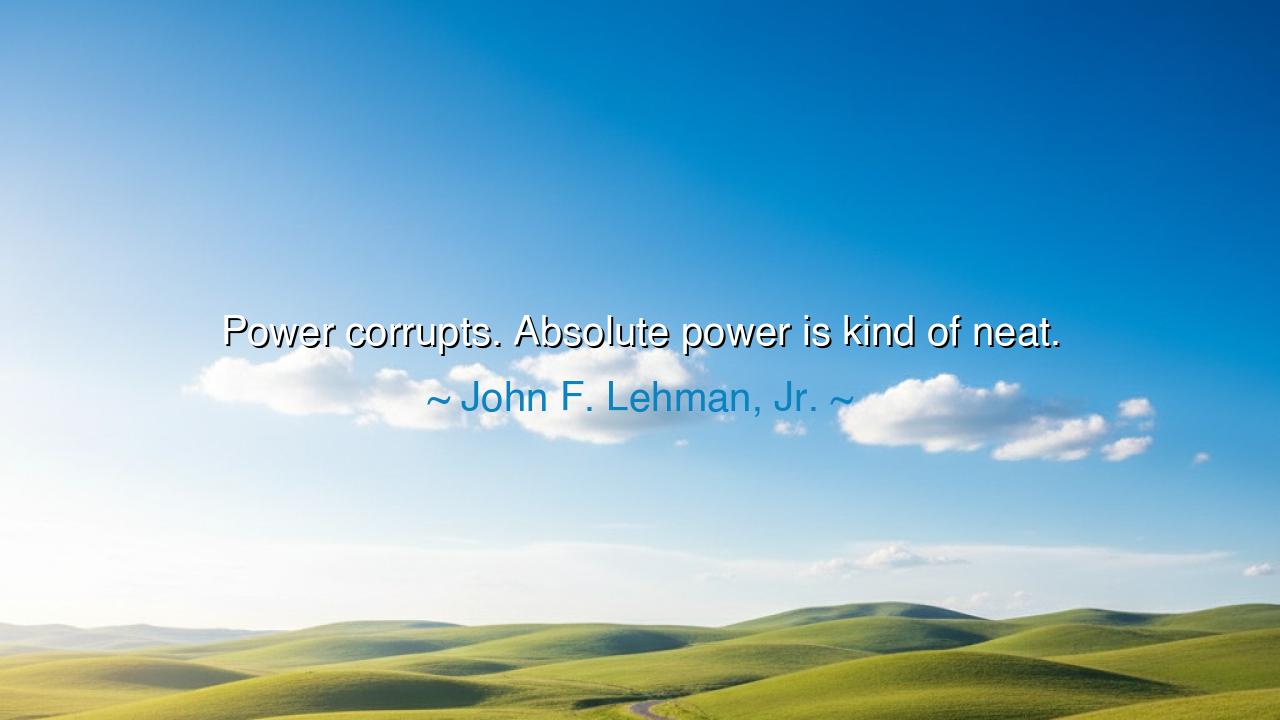
Power corrupts. Absolute power is kind of neat.






The words of John F. Lehman, Jr.—“Power corrupts. Absolute power is kind of neat.”—strike like a double-edged blade, playful in tone yet piercing in truth. They echo the ancient warning that power, when held too tightly, warps the spirit, bending even noble intentions toward vanity and dominion. Yet hidden in jest is a confession: that absolute authority carries a dangerous allure, a sweetness that tempts even the strongest of hearts. It is a reminder that men are not only corrupted by power’s weight, but also seduced by its charm.
This utterance carries within it the shadow of Lord Acton’s great maxim, “Power tends to corrupt, and absolute power corrupts absolutely.” Lehman’s twist upon this solemn truth exposes the paradox: while philosophers and sages warn of tyranny’s dangers, the human heart cannot deny the strange exhilaration of control. To command without resistance, to shape the world by one’s will—this is intoxicating. The danger is not that power is merely burdensome, but that it is delightful, and thus more perilous.
History is filled with examples. When Julius Caesar crossed the Rubicon, he defied Rome’s laws, stepping from general to dictator. His enemies feared tyranny, yet his followers adored the order and strength he brought. For Caesar, the taste of absolute command was not bitter but sweet, until envy and daggers ended his reign. So too does Lehman’s jest remind us that the intoxication of rule is often what blinds men to the corruption it brings.
The quote is also a reflection of human weakness. For though man knows the path of virtue, he is often drawn toward the thrill of dominion. Even leaders who begin in righteousness may find themselves enthralled by unchecked authority. The danger is not only in the abuse of power, but in the failure to recognize how pleasing that abuse can feel to the one who wields it.
Thus, let this saying be passed down as both warning and mirror. To laugh at power’s allure is to admit its seduction. Guard your soul, for corruption does not come only by cruelty, but by pleasure disguised as authority. And remember this teaching: it is not enough to resist the weight of power—you must also resist the joy of its absolute sway. Only then may a ruler hold greatness without being undone by the very force that seems so neat.






NMhue nguyen mai
It’s a clever and slightly cynical observation about leadership. The tone almost feels like someone winking at the audience, acknowledging that power has its perks despite the moral cost. I can’t help but think about history—how many leaders started with noble goals but eventually became the very thing they once opposed? Maybe this quote captures that slippery slope perfectly.
PVNguyen Phuong Vy
This line feels like a commentary on human psychology. There’s an honesty in admitting that power can feel ‘neat,’ even when we know it’s corrupting. It makes me wonder—does acknowledging that temptation make someone more self-aware, or does it normalize dangerous behavior? Perhaps the most powerful people are those who recognize this allure and resist it, rather than deny it exists.
Ddat
The humor in this statement is sharp but also dark. It points out how easily power can shift from responsibility to self-indulgence. I find it fascinating how something so dangerous can also seem appealing to people. Maybe this reflects the duality in human ambition—wanting influence for good intentions, but being tempted by the thrill of control once we have it.
NQPham Nhu Quynh
This quote really strikes me as both ironic and unsettling. It plays on the old saying about power corrupting but adds a twist that feels almost playful. Is it meant as satire or a genuine admission of how seductive power can be? It raises the question—do people in authority truly believe they can handle absolute control without moral compromise, or is corruption simply part of human nature?